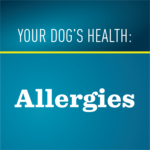Your Dog’s Health
Dog Allergies
 When the spring thaw brings a pollen boom, allergy sufferers often approach the season with trepidation. But, are dogs affected by the same factors?
When the spring thaw brings a pollen boom, allergy sufferers often approach the season with trepidation. But, are dogs affected by the same factors?
Similar to humans, allergies can be very problematic for dogs. Reactions can occur when allergens are inhaled, consumed, or come in contact with a dog’s skin. The same substances can trigger dog and human allergies. A few of these items include:
- Dust and dust mites
- Mold spores
- Weed pollens, trees, and grass
- Food ingredients
- Cleaning products
- Rubbers and plastics
Sensitivities can develop at any point in a dog’s life, though they can be more common in some breeds than in others. A few common allergy symptoms in dogs include:
- Paw chewing
- Increased scratching
- Itchy, runny eyes
- Itchy back and ears
- Sneezing and vomiting
While allergy suffering is usually not a life-threatening condition, it can be incredibly uncomfortable, and lead to secondary infections and scabs on the skin. If your dog is exhibiting allergy symptoms, or you think they may have allergies, contact your veterinarian immediately.
For more general information on dog allergies, visit PetMD.

